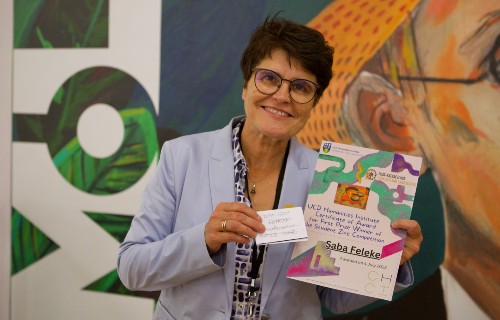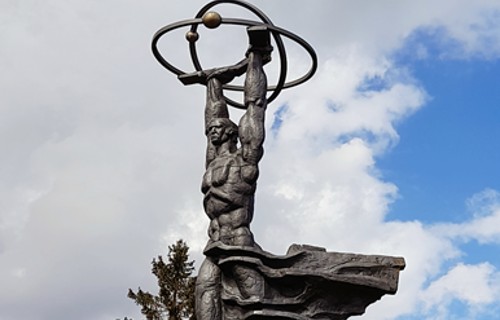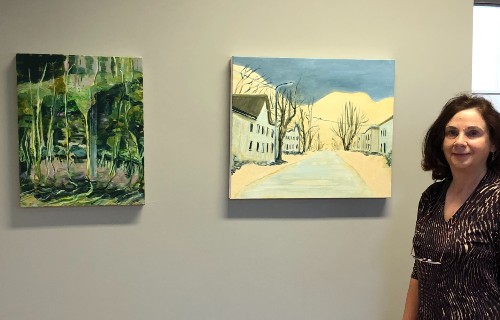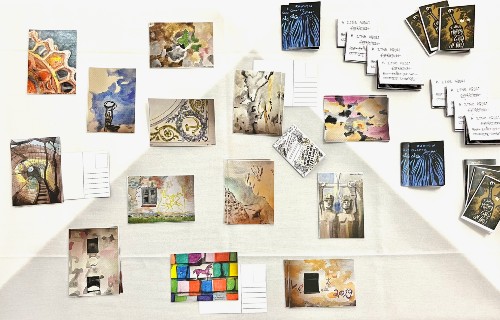
UCD Humanities Institute leads this two-year, Andrew W. Mellon-funded 'Global Humanities Institute 2023' project, supported through the Consortium of Humanities Centers and Institutes (CHCI).
Principal Investigator (PI): Professor Anne Fuchs, Director of UCD Humanities Institute (pictured).
Co-Investigators: Dr Sarah Comyn, UCD School of English, Drama and Film, Dr Megan Kuster, UCD Humanities Institute.
'Post-extractivist legacies and landscapes: Humanities, artistic and activist responses' takes a transnational and interdisciplinary approach to exploring interactions between creative arts practices and local activism in the transition from mining to post-mining in different regions.
PI Professor Anne Fuchs described the project as "Drawing on methodological frameworks from anthropology, history, literary studies, environmental studies, bio-archaeology and activist art practice to investigate significant sites of extractivism.
"The focus of the project is the comparative exploration of creative arts practices and local activism in the transition from mining to post-mining and in the mobilisation of opposition to new practices of extractivism."
The fascinating project coordinates several strands that incorporate contributions from different key groups, individuals and target audiences. With three parts (methodologies, site studies and creative responses), generating both artistic and academic outputs, the project uses multiple lenses to investigate former, ongoing and proposed sites of mining in Ireland, Germany, Estonia, South Africa, Oceania and the Gulf Coast of the United States.
Pre-Institute (Estonia), Main Institute (Online), Post-Institute (South Africa)
The team developed a series of events in order to connect project partners and stakeholders, and generate dialogue and outputs. To achieve critical engagement with community and multi-modal artistic approaches, the 'main institute' event - a five-day online symposium from 4-8 July facilitated by UCD Humanities Institute and project partner Museum of Literature Ireland (MoLI) - delivered a hybrid format that allowed participation from 26 countries, including 12 artists and scholars from 31 institutions across the world.
Project investigator Dr Sarah Comyn said: " One of the primary objectives of this project has been to not only encourage and support interdisciplinary conversations and research, but also to involve undergraduate and graduate students as well as members of the activist and artistic communities most connected to extractivist sites.
"The winning entries of the student 'zine' competition (see below) are testament to the creative and international engagement by undergraduate students across core partners. The PhD poster panel session included six UCD and international contributors allowing for global engagement with their emerging research."
"Our project artist, Judy Carroll Deeley produced six new works based on our initial trip to Estonia which were exhibited at MoLI and the Humanities Institute. We also collaborated with MoLI to co-commission a sound installation by writer Ian Maleney which formed part of their ‘First Fridays’ programme.
"One of the highlights of our programme for participants was the final day of field trips to the community-led Abbeyleix Bog Project. The conversations from the event are continuing via a postcard exchange project and we look forward to our final event being hosted by the WISER Centre at the University of Witwatersrand, South Africa, at the end of the year."
Show and Tell
The project website doubles as platform for the public to explore co-created outputs including a blog, series of podcasts (available in July), a digital exhibition of new artworks from professional artists, and a showcase of student 'zines' resulting from an artist-led workshop and competition.
In addition, the project will develop and make available some open access online syllabi, as well as arising research papers and other academic and creative outputs.

Blog
The project blog offers a collection of articles by scholars and students exploring interesting themes around the subject, including:
- Performative Masculinity and the Estonian Mining Industry
- White Vest Imaginaries: On the Afterlife of Soviet-Extractivist Masculinities
- Post-Extractivist Landscapes and the Renewable Future
- The Faces of Mining

Gallery
In the gallery, visitors can view the exhibition 'Capitalocene - From A Time of Ambition' by project artist Judy Carroll Deeley, and over time other collections from contributing artists. The exhibition centres on the theme of commercial mining activity and its aftermath - reflecting the project's broader view of the mining industry, its ‘exploit and flee’ strategy still used by many large corporations today, and the consequences for indigenous peoples, flora, and fauna.
There is also an image gallery and video (below) on the collection 'Mine Land' by Judy and her husband, poet Patrick Deeley, with poems, prose and extracts paired with illustrations, related to their experience of the Tynagh mine in West of Ireland.
 Zine Competition
Zine Competition
The aim of this student art competition is to make public artists’ ideas about the concept of regeneration in the context of extractivism.
Undergraduate students at NCAD, IADT, UCD, Tallinn University, the University of Witwatersrand, Rice University, and the Australian National University were invited to submit entries under the themes of regeneration, re-wilding, recovery, rehabilitation and ruination, envisioning the future for landscapes and local communities post-mining.
Entries could be two-dimensional artistic works in any medium, to be adjudicated by Judy Carroll Deeley (Main Project Artist), Helen Doherty (Media Consultant) and Nic Pillai (Creative Futures Academy).
To support the competition, the project hosted an online workshop on zine creation with Irish visual artist Catherine Foyle.
Led by the UCD Humanities Institute, the project involves a collaboration with the UCD Earth and Discovery Institutes (University College Dublin, Ireland), the Museum of Literature Ireland (MoLI), the Centre of Excellence in Intercultural Studies (Tallinn University, Estonia), the Wits Institute for Social and Economic Research (University of Witwatersrand, South Africa), the School of Culture, History and Language (Australian National University) and the Humanities Research and Environmental Studies Centers (Rice University, US).
Learn more at https://extractivistlegacies.org/